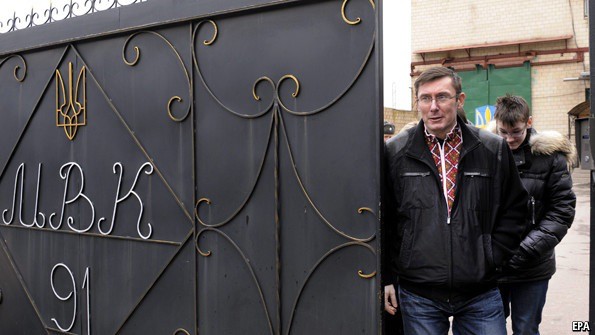
Ukraine Continues to Play with the Rules, Not by the Rules
Publication: Eurasia Daily Monitor Volume: 10 Issue: 72
By:

In October 2002, President Leonid Kuchma visited Warsaw where North Atlantic Treaty Organization (NATO) Secretary General Javier Solana told him, “Sometimes Ukraine seems to be playing with, not by, the rules” (https://www.day.kiev.ua/en/article/day-after-day/play-not-rules). A most recent case in point is the April 7 “pardon” of former Interior Minister Yuriy Lutsenko in an attempt to appease the Aleksander Kwasniewski–Pat Cox commission (composed of the former presidents of Poland and the European Parliament, respectively). The commission is due to provide an interim report to the European Parliament on April 18, 2013, regarding 11 benchmarks on reform and selective use of justice in Ukraine (Interfax, April 15). Although released, Lutsenko’s criminal record remains, and he cannot stand for office or enter government until 2023 (eight years after his prison term was to end).
The release was carefully staged by Ukrainian authorities, with Valeria Lutkovska, Parliamentary Human Rights Ombudsperson requesting two days earlier for Lutsenko’s “pardon” on health grounds because all legal avenues in Ukraine were now closed. The European Union, the United States and the US Helsinki Commission responded with a renewed demand for the release of Yulia Tymoshenko (https://www.csce.gov/index.cfm?FuseAction=ContentRecords.ViewDetail&ContentRecord_id=455&Region_id=0&Issue_id=0&ContentType=S&CFID=23561413&CFTOKEN=99539036; https://www.whitehouse.gov/the-press-office/2013/04/08/statement-nsc-spokesperson-caitlin-hayden-ukraine).
All legal avenues have been exhausted in the Tymoshenko case as well, with the last appeal rejected in August 2012. The Kharkiv Human Rights Protection Group wrote, “There is nothing to stop Ms [sic] Lutkovska from seeking a pardon, nor is the President granting it” as “[t]he precedent has, after all, been set with Lutsenko’s pardon being issued on the basis of an appeal from the Ombudsperson and not on his personal request” (https://khpg.org.index.php?id=1365721114).
The decision to release or keep Tymoshenko imprisoned is in the hands of President Viktor Yanukovych. Playing with the rules means that Lutsenko can be released because he is not a serious threat to the president’s strategy while a freed Tymoshenko would be a double threat to Yanukovych’s re-election in 2015 and, failing that, as a mobilizer of a second “Orange Revolution.” Tymoshenko will, therefore, not be released (see EDM, November 4, 2011)—especially following the launching in February of criminal murder charges against her (see EDM, February 25, March 8).
Political and economic reforms, another aspect of the Kwasniewski-Cox commission, are unlikely to resume ahead of the 2015 elections; an International Monetary Fund (IMF) delegation left Kyiv last week (April 10) without a new agreement because of Ukraine’s failure to accept stringent economic restructuring (Bloomberg, April 10).
Since 2010, playing with the rules has become central to the authorities’ “Yanukovych Forever!” (https://jamestownfoundation.blogspot.com/2012/03/viktor-yanukovych-forever.html) and “Stop Orange Revolution-2” strategy.
The strategy has six policies and outcomes.
• In 2010, Ukraine’s parliamentary rules were changed to permit individual deputies (as opposed to factions) to join parliamentary coalitions, leading to widespread political corruption (https://jamestownfoundation.blogspot.com/2012/02/political-corruption-and-preparations.html). In the same year, the Constitutional Court annulled the 2004 constitutional changes, thus returning Ukraine to the 1996 presidential constitution.
• The ruling Party of Regions has changed election dates three times—local elections from May to October 2010, parliamentary from 2011 to 2012 (the 1996 constitution allows for four-year parliamentary terms) and Kyiv city council and mayoral election from 2012 to 2015.
• The parliamentary election law was changed from a proportional system (used in 2006 and 2007) to a mixed proportional-majoritarian one for the 2012 elections. A referendum is to be held this year to change the law to a fully majoritarian system, used only once in 1994 (https://www.pravda.com.ua/news/2013/04/2/6987097/). Democratic Initiatives Foundation sociologist Iryna Bekeshkina warned that the referendum, if it passes, will mark “the end of democracy in Ukraine” (https://tyzhden.ua/News/76667). The law on referendums itself, which was adopted last year, plays with the rules by permitting the authorities to control the results (https://korrespondent.net/ukraine/politics/1540955-cik-prinyal-ryad-dokumentov-kasayushchihsya-podgotovki-ko-vseukrainskomu-referendumu). Yanukovych is politically vested in the results of this referendum, which will be a vote of confidence on his rule (https://www.pravda.com.ua/articles/2013/04/3/6987163/). If it passes, Bekeshkina argues, the election law changes will allow “Yanukovych [to] remain forever” by providing him with a means to achieve “an absolute parliamentary majority and to change the constitution as [he] wishes” (https://tyzhden.ua/News/76667; https://blogs.pravda.com.ua/authors/taran/51607da3d57fc/).
• The referendum will change presidential elections, which were held with two voting rounds on five occasions since 1991, to a single round (https://www.pravda.com.ua/articles/2013/04/3/6987163/). The aim is to ensure Yanukovych wins immediately in 2015 without having to face a single opponent in a second round of voting. Eastern Ukrainian political forces will unite around one candidate and can buy off the Communists. Western Ukrainians (like the opposition throughout Eurasia) are divided among a number of candidates and would collectively, therefore, lose in the first election round (the exception was Ukraine in 2004).
• The authorities have shown a willingness to adopt legislation behind closed doors without the opposition in attendance. Such a closed-door session on April 4, described as a “putsch” by opposition media, allegedly included 244 lawmakers while excluding all opposition deputies. The parliament has refused to provide a copy of the signatures of the 244 supposedly in attendance (as required under new regulations) and no lists of deputies who voted have been posted on the parliamentary web site (https://w1.c1.rada.gov.ua/pls/radan_gs09/ns_h1). Nevertheless, the Higher Administrative Court of Ukraine ruled that the April 4 session was legitimate (https://www.pravda.com.ua/news/2013/04/12/6988074/).
• If the referendum passes, the president will likely disband the parliament, claiming it is not working, and schedule pre-term elections under the new majoritarian election law, consequently leading to the marginalization of the opposition, as in Russia. A rubber stamp parliament could then change the constitution along the lines of the flawed and not internationally recognized April 2000 referendum, which, if adopted, would have expanded presidential powers and created a bicameral legislature (https://blogs.pravda.com.ua/authors/leschenko/5155e1f5c61e2/; https://blogs.pravda.com.ua/authors/popov/514186a977fe7/). In addition to a single-round presidential election, Yanukovych’s administration will seek to reduce the number of deputies from 450 to 300, turn the parliament bicameral with an appointed Senate, and remove legislative deputies’ immunity from prosecution. Without immunity, parliamentarians will be totally subservient to the executive.
Playing with the rules through these six policies reveals a lack of commitment to European values. Releasing Lutsenko will in all probability be insufficient for the Kawsniewski-Cox commission to recommend that the EU sign the Association Agreement with Ukraine at the Eastern Partnership summit in November. And without a clear path toward European integration, Ukraine may be left to drift closer into Russia’s orbit.




